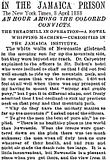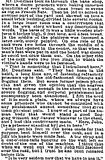|
Corpun file 21432

The New York times, 8 April 1888
In the Jamaica Prison
An Hour Among the Colored Convicts.
The Treadmill in Operation -- A Novel Whipping Machine -- Curiosities in the Jamaica Institute.
By William Drysdale
(extracts)

Click to enlarge |
The white walls of Newcastle glistened in the morning sun far
up the mountain side, but they were beyond our reach. Dr.
Carpenter explained to the officers in Mr. Bolton's hotel who
were inclined to chaff us that I did not feel well enough to ride
up the mountain path, and in one sense that was true enough.
[...]
There were any number of other things to see, and we soon
determined to visit some of the public institutions. [...] We
took to the carriage once more and returned to Kingston. Our next
objective point was the penitentiary, in the east end of the
city, bordering on the harbor. It is a big enough institution,
certainly, to hold all the criminals on the island of Jamaica.
Very high walls, with towers at the corners, inclose the 11 acres
of ground on which the prison buildings stand. We drove up to a
great iron gate, set between solid stone columns, and inquired
for Mr. Douglass, the Superintendent. That gentleman soon came
out and invited us to enter, and himself conducted us over the
establishment. Mr. Douglass is a man of great experience in
prison management. In 1883, when the Jamaica Prison was in pretty
bad condition, the Government induced him to leave the Woking
Prison, in England, and take charge of the Kingston Penitentiary,
and he has brought order out of chaos and made the prison a model
institution in every respect.

Click to enlarge |
[...]
Then he led us across to another part of the yard and showed
us into a small brick building, divided into several rooms. In a
large inner room was a contrivance that told its own story
without any description in words. The basis of it was a little
wooden platform 6 inches high, 6 feet long, and 4 feet broad. In
the middle of the platform was fastened a large cask, nicely
painted. On one side of the cask were two holes through the
middle of a board that opened in the centre, so that when a man's
feet were put in and the board was closed he could not draw them
out. On the other side of the cask were two iron rings, to which
the victim's hands were to be fastened.
"That is something that I introduced here," Mr.
Douglass said. "They had been in the habit, a long time ago,
of fastening refractory prisoners up to the old-fashioned
triangle and flogging them. But some former prison physician had
given the opinion that the negroes were not strong enough in the
chest to stand a severe flogging, and corporal punishment had
consequently been abandoned. I felt the need of it in such a
place, where we always have some prisoners who cannot be
controlled with any punishment except something that gives them
physical pain. I knew of a part of the human body that would
stand a good flogging without any danger whatever to the chest,
and I had this contrivance made. 'Here, John, [to a prisoner
standing by] get in here.'"
John put his feet in the holes made for that purpose, bent
himself over the cask, and in a jiffy his hands were made fast. A
big strap and a cat-o'-nine-tails hanging on the wall left no
doubt of the use of the machine. I think that when we went out we
left John still fastened over the cask, but I trust he has been
released before this.
"It is very seldom now that we have to use it," Mr.
Douglass told us. "Just the knowledge that it is here has
almost as good an effect as if we kept it constantly going. The
men are not fond of too close an acquaintance with either the
strap or the cat."
[...] Afterward, in the office, Mr. Douglass
told us that the prison has accommodations for 568 convicts, male
and female, the women being kept entirely separate. The daily
average number of prisoners is about 500 [...]
| |
About this website
Search
Country files: Jamaica
External links: Prison CP
Archive up to 1975: Jamaica
Video clips
Picture index
|


![]()